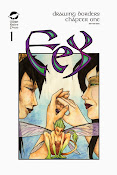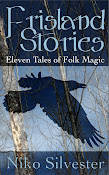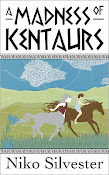- The Queen's Conjurer by Benjamin Wolley. I knew who John Dee was before I read this book, but I didn't realize he was a legitimate scientist as well as a particularly crackpot astrologer. This biography of Queen Elizabeth's favourite astronomer/angel contactee was a little dry at times, but was mostly just really, really interesting. (And, by the way, I adore the remainder/bargain tables at Munro's Books.)
- Voodoo Science by Robert Park. This was a fabulous look at things pretty much on the border between science and pseudoscience. Some of the stuff Park covered was obviously crackpot, but some of it was less obvious. I found the part on homeopathy especially enlightening.
- The Search for the Giant Squid by Richard Ellis. I've been wanting to read Ellis's seamonster book for ages, so when I saw this one at Munro's (on the aforementioned remainder table), I had to have it. I'm not sure I buy all of Ellis's explanations for sea-serpent sightings (some of them look/sound more like whales or really big sharks than squid, but then I'm not a marine biologist). This is a great book, though, with my favourite ingredients for a volume of its sort: sections on biology and sections on folklore and sections on literature and sections on . . .
- On Writing by Stephen King. I reviewed this one for my work site. I'm not a fan of King, largely because I've not read more than a short story or two. This is a really good read, though, even if you're not a writer. There's lots of insight into how writers (or one writer, anyway) work. It's made me take a second look at some of those huge novels I keep seeing in the stores. Now if I could just find one really cheap.
- The Complete Sherlock Holmes, Volume 2 by Sir Arthur Conan Doyle. At last, I get to some fiction! 8 or 9 hundred pages of Sherlockian goodness, this is. I was constantly surprised by how well these stories stand up so many years later, especially compared to some much more recent books.
- Timeline by Michael Crichton. I think this is the first Crichton book I've ever read. And after reading Peter Atkin's chapters on quantum mechanics and spacetime in Gallileo's Finger, I thought the time-travel mechanism really didn't work very well. It would probably have read better if Crichton had been more vague and trusted that his readers didn't need to have a full explanation. Also, the plot seemed to be pretty much a rack on which to hang all those ideas and carefully researched details about medieval France. That said, it was a pretty good, if pulpy read. And I kind of needed something pulpy after all that cerebral Holmes stuff.
- The Stone Circle by Gary Goshgarian. I picked this one up--at Value Village, I think--because the cover blurb reminded me very, very much of Grahame Joyce's Dark Sister (a lovely book that I very much recommend). I was curious to see how much alike they were. Plus the protagonist was an archaeologist. Anyway, there was some pretty crackpotty stuff--Mystery Hill and all--and it was not a fabulous book, but an okay escape for a few hours.
- Shadows in the Sea by Thomas B. Allen. A Times Colonist book sale find, this one's all about sharks (and skates and rays). The first few sections were a little too focussed on shark attacks, but there was lots of great folklore and biology here, too. And recipes. Plus, it was the perfect thing to read while "Daughters of the Sea King" (about halfway done now) was still an idea rattling around in my brain.
- A History of Pirates by Nigel Cawthorne. I kept thinking this guy's name was Nathaniel Hawthorne. Wouldn't that be confusing? Anyway, this is another post-Pirates of the Caribbean, gotta-read-about-pirates book. It's not as good as David Cordingly's book (but then, this guy isn't the world's foremost expert on pirates), but still worth reading.
- How We Believe by Michael Shermer. Another skepticism book, this time about belief--how and why people believe stuff and how that relates to why people believe pseudoscience instead of science. Also, it's very well written.
Anyway, that's the next ten. There are still more before I get to the end (looks like exactly ten more, unless I finish something else before I get back to this list).







No comments:
Post a Comment